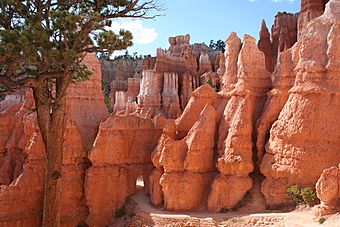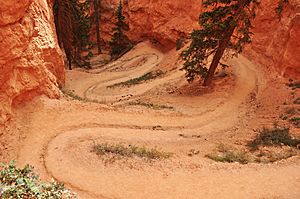Bryce Canyon National Park Scenic Trails Historic District facts for kids
Quick facts for kids |
|
|
Bryce Canyon National Park Scenic Trails Historic District
|
|

Queen's Garden Trail, August 2006
|
|
| Nearest city | Bryce Canyon, Utah |
|---|---|
| Area | 51 acres (21 ha) |
| Built by | Civilian Conservation Corps |
| Architect | National Park Service |
| MPS | Bryce Canyon National Park MPS |
| NRHP reference No. | 95000422 |
| Added to NRHP | April 25, 1995 |
The Bryce Canyon National Park Scenic Trails Historic District is a special group of old trails in the middle of Bryce Canyon National Park in Utah. These trails are so important that they are listed on the National Register of Historic Places (NRHP). This means they are protected because of their history and beauty.
Contents
Exploring Bryce Canyon's Amazing Trails
This trail system was built so that people could easily see or walk down into Bryce Canyon's amazing natural "amphitheater." An amphitheater is like a giant, bowl-shaped area. Here, it's filled with cool rock formations called hoodoos.
Hoodoos are tall, thin spires of rock that have been shaped by wind and water over millions of years. They look like giant, colorful statues! The trails start from the edge of the Paunsaugunt Plateau, which is a high, flat area.
Main Trails in the District
There are five main trails that are part of this historic district:
- Navajo Loop Trail
- Queen's Garden Trail
- Fairyland Trail
- Peekaboo Loop Trail
- Rim Trail
Most of these trails were built between 1917 and 1935. They connect to each other, forming a big network for hikers. Some parts of the trails were even built by young men from the Civilian Conservation Corps (CCC). The CCC was a special program during the Great Depression that helped people find work.
The Navajo Loop Trail mostly follows its original path. It takes you to a famous part of the amphitheater called "Wall Street." This area has tall, narrow walls of rock that make you feel like you're walking through a canyon.
Queen's Garden Trail
The Queen's Garden Trail connects two popular viewpoints, Sunrise Point and Sunset Point. It leads to a rock formation that looks like Queen Victoria. This trail even has two cool tunnels you get to walk through!
Peekaboo Loop Trail
The Peekaboo Loop Trail is about 4.4 miles (7.1 km) long. It starts at Bryce Point. This trail goes into Peekaboo Canyon and then crosses over to Bryce Canyon. You'll see amazing views, including the "Wall of Windows" formation. This trail also has a tunnel.
Fairyland Trail
The Fairyland Trail is about 5 miles (8 km) long. It winds through Fairyland Canyon and Campbell Canyon. It's a great way to see many different hoodoos and unique rock shapes.
Rim Trail
The Rim Trail follows the very edge of the Paunsaugunt Plateau for about 5.3 miles (8.5 km). It runs between Fairyland Point and Bryce Point. Some parts of this trail that get a lot of use are paved, making them easier to walk on.
Why These Trails Are Special
The Bryce Canyon trail system was officially added to the National Register of Historic Places on April 25, 1995. This shows how important these trails are to the history and natural beauty of the park.
A Look Back: How the Trails Were Built
Building these trails started with the areas closest to the Bryce Canyon Lodge. This was between Sunrise Point and Sunset Point.
Early Trail Building Efforts
Some parts of what is now the Navajo Loop Trail might have been built as early as 1917. This was right after the National Park Service took over managing the park from the United States Forest Service. There might even be older paths from the U.S. Forest Service included.
The Queen's Garden Trail, the Navajo Trail, and the Peekaboo Loop Trail were mostly finished around 1929. Most of these were for people walking, but the Peekaboo trail could also be used by horses. This trail even had a special spring with a water fountain for people and a trough for horses!
Completing the Network
More trails were built to connect these main paths between 1929 and 1935. The Civilian Conservation Corps (CCC) played a big part in this. They helped build sections of the Rim Trail and the Fairyland Trail in 1934-1935. Their hard work helped create the amazing trail system we see today.
 | Kyle Baker |
 | Joseph Yoakum |
 | Laura Wheeler Waring |
 | Henry Ossawa Tanner |




